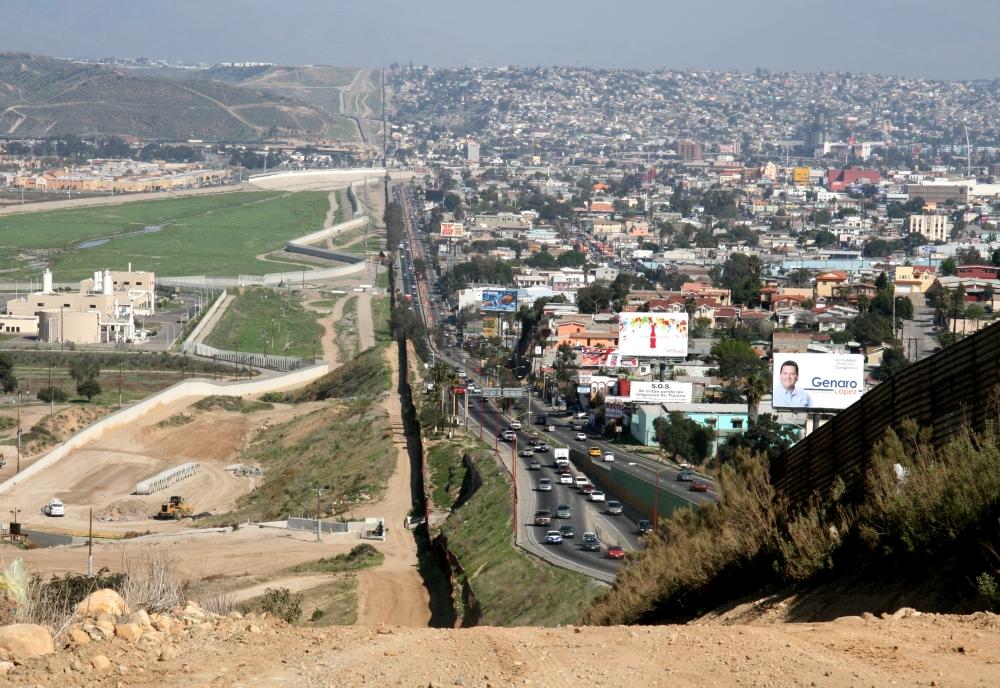
Section Branding
Header Content
Analysis: President's powers at the border need to be 'carefully controlled'
Primary Content
LISTEN: Republicans in Georgia are demanding that President Biden take action after a man who entered the country illegally was arrested for the killing of a woman on the University of Georgia Athens campus last week. But what does the president have the power to do at the border? GPB's Peter Biello speaks with legal analyst Ronald Chapman.

Republicans in Georgia are demanding that President Biden take action after a man who entered the country illegally was arrested for the killing of a woman on the University of Georgia Athens campus last week. But what does the President have the power to do with respect to the border without the approval of Congress?
For more on this, we turn to legal analyst Ronald Chapman. He spoke with GPB’s Peter Biello.
Peter Biello: Some Republicans have called on the president to shut down the U.S. border with Mexico. Could the president unilaterally do that?
Ronald Chapman: Well, we have a precedent for this, Trump v. Hawaii. We all remember that case. It happened right at the outset of COVID. The president's executive order and the ability to close down the borders was challenged. And in that case, the Supreme Court overwhelmingly upheld the president's authority. But what the president is required to do in that instance is show that the immigration challenges the security of the United States. And in that case, Trump had some very specific findings related to that. So the answer is yes, but this power needs to be carefully controlled and can only be exercised when there is a threat to the security of the United States.
Peter Biello: And could the president make a credible argument that those conditions are in place now?
Ronald Chapman: I think that some Republicans are calling for that as a credible argument. They repeatedly cited two undocumented immigrants engaging in certain criminal activity. They're suggesting that terrorists have come across the border. We've seen arguments to that effect, but we really haven't seen evidence or fact-finding related to it. What Trump did in Trump v. Hawaii or before that for his executive order, is he engaged in a study, actual fact-finding related to that, instead of just arguing these points. What Congress would have to do is have specific fact-finding related to a threat that an open border — an open southern border — poses.
Peter Biello: Alternatively, Congress could simply give the president the authority to do something like this, but the political will may not be there right now for whatever reason.
Ronald Chapman: Certainly, I think that regardless of who is in office in the next term, the political will will not be there to allow congressional action on the border. But Trump v. Hawaii really tells us that that may not be necessary. The president is granted broad authority to do what he needs to do on the border. The issue there would be funding. Now, historically, Border Patrol has typically been funded, and Congress doesn't seem to want to revoke that funding. So they have the funding right now to do what they need to do. Obviously, President Biden is calling for additional resources to protect the border.
Peter Biello: Do you see any options for President Biden right now that maybe do something that a lot of Republicans are calling for general taking of action, but maybe falls short of closing the border entirely?
Ronald Chapman: I think, you know, politically, he is protecting himself quite well here by not taking Gov. Greg Abbott's bait and essentially federalizing the National Guard to protect the border. I think right now some additional action by executive order, if he did want to provide additional protections on the border, would be necessary and certainly possible. But I think politically — and, of course, I'm a lawyer, not a politician — but politically, he's in a bit of a bind right now because he's got people on both sides arguing that he should take completely different actions. And I think that his effort in calling for additional funding and not acting until that funding is obtained, is probably the best political move for him at this point.
Peter Biello: What authority do states have right now to regulate their own borders? Where the states' rights come into play?
Ronald Chapman: Yes. I think the important legal question here is the application of states' rights to the border issues. We have, previously Arizona and now Texas, saber-rattling quite a bit and trying to enact their own laws on border controls to essentially create their own Immigration and Customs Enforcement mechanisms and to arrest people who cross the border, as they say, unlawfully. The Supreme Court is about to hear that case, related to the southern border. And I think it's going to be interesting to see if the Supreme Court holds to their decision in the Arizona case or, if this different Supreme Court is going to allow more state authority. I suspect that they will allow more state authority, because if you read that Arizona decision, you will see Justice Clarence Thomas and some of the other, notably conservative justices seem to allow more states rights on the border. But the composition of the court still kind of adhered to executive authority. And so the president has more power. I think that states will get more power on that border pretty quickly as a result of the current composition of the Supreme Court when they hear that Texas case.

